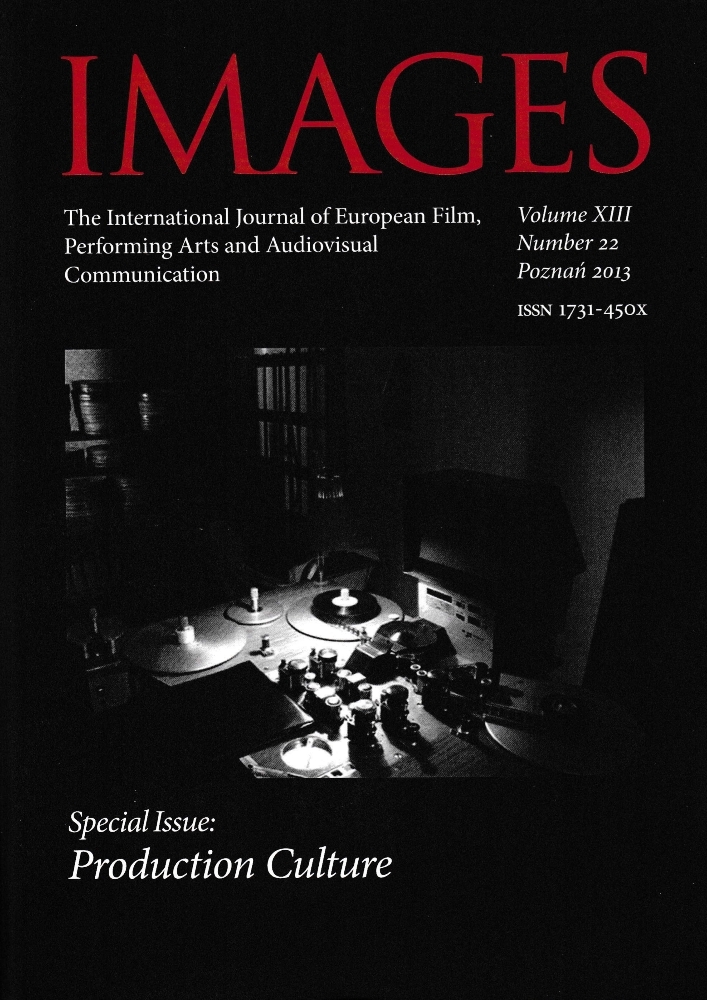Abstract
After four co-productions which the East German and Czech studios made from 1957 to 1965, a five-year hiatus in DEFA-Barrandov co-productions took place. During the Czechoslovak New Wave era, the Czech filmmakers gave DEFA the cold shoulder. But the process of “normalisation” that took place after the August 1968 Warsaw Pact invasion of Czechoslovakia put both the regimes and the film industry structures back in sync. While the end of independent production groups at DEFA and Barrandov damaged the creative environment and the quality of productions as a whole, it also had an unforeseeable effect: the revival of DEFA-Barrandov co-productions. On the German side, DEFA was interested in help from experienced practitioners, especially scriptwriters. On the Czech side, Barrandov´s filmmakers—now isolated from previous contact with western partners and under strict ideological control—strove to shape the DEFA projects they were offered according to their own criteria. There was thus a harmonization of goals and tools, which worked especially well in the sphere of children movies. This was not only because this type of production rarely crashed against divergent interpretations of the past by the two partners. There were two more important reasons as well: namely, that the dramaturge group for children’s movies was under looser ideological control by Barrandov management; and that the personal continuity with the pre-normalization era was stronger in this group than was the case for other groups. In the 1970s, both studios were motivated to find an effective mode of co-operation.References
J. Havelka,, Čs. Jilmové hospodářství 1961‒1965, Československý flmový ústav, Praha 1975, p. 250.
J. Havelka, Čs. Jilmové hospodářství 1966‒70.
J. Havelka, Československý flmový ústav, Praha 1976, p. 259.
A.J. Liehm, “Orientace našeho flmu,” Literární noviny 14, 1965, p. 8.
G. Francl, “Strašná žena/Délka polibku devadesát/Perlový náhrdelník,” Kino 20, 1965, p. 5.
G. Focke, “Erschrecken über ‘Eine schreckliche Frau’,” Freiheit, August 9,1965.
R. Seydel, “Eine Schwalbe macht noch keinen Sommer,” Film¬spiegel 17, 1965, p. 9.
D. Wolf, Gruppe Babelsberg. Unsere nichtgedreh¬ten Filme, VerlagNeues Berlin, Berlin 2000, pp. 47‒49.
P. Skopal, “Reisende in Sachen Genre – von Barrandov nach Babelsberg und zurück. Zur Bedeu-tung von tschechischen Regisseuren für die Genre-flmproduktion der DEFA in den 1960er und 1970er Jahren,” [in:] DEFA international. Grenzüberschreiten¬de Filmbeziehungen vor und nach dem Mauerbau, eds. M. Wedel, et al., Springer Verlag, Wiesbaden 2013, pp. 249‒266.
T. Bergfelder, “The Production Designer and the Gesamtkunstwerk. German Film Technicians in the British Film Industry of the 1930s,” [in:] Dissolving Views. Key Writings on British Cinema, ed. A. Higson, Cassell, London–New York 1996, pp. 21‒23.
T. Heimann, DEFA, Künstler und SED-Kulturpolitik: zum Verhältnis von Kulturpolitik und Filmproduktion in der SBZ/DDR 1945 bis 1959, Vistas-Verlag, Berlin 1994, pp. 221‒222.
V. Zimmermann, “Proměnliyá spojenectyí. NDR a její yztahy k Českosloyensku a Polsku y padesátých a šedesátých letech 20. století,” [in:] Československo a dva německé státy, eds. C. Buchheim, E. Iyaničkoyá, K. Kaiseroyá, & V. Zimmermann, Albis International, Praha 2011, pp. 83‒98.
I. Klimeš, “Koprodukce jako politikum. K pozadí yztahů mezi flmoyými studii DEFA a Barrandoy po potlačení Pražského jara.” An unpublished manuscript.
DEFA international. Grenzüberschreitende Filmbeziehungen vor und nach dem Mauerbau, ed. M. Wedel, et al., Springer Verlag, Wiesbaden 2013, pp. 279‒280.
M. Ivanova, DEFA and East European Cinemas: Co-Productions, Transnational Exchange and Artistic Collaborations. Ph.D. Diss., University of Texas, Austin 2011, p. 95.
Letter from Ludvík Toman to the head of the Barrandov Studios Miloslav Fábera, May 10, 1972. Barrandov Studios Archive, fle “Tři oříšky pro Popelku.”
Report of a journey, Eduard Hofman, January 1973. Barrandov Studios Archive, fle “Tři oříšky pro Popelku.”
Letter from Hofman to the producer Z. Oves, June 12, 1974. Barrandov Studios Archive, fle “Do-brodružství s Blasiem.”
License
Copyright
© by Adam Mickiewicz University, Poznań, 2013
OPEN ACCESS
